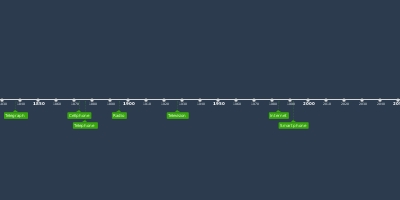Industrial revolution timeline
Category: Other
Updated: 15 May 2018
Contributors

Created byCaitlin
Attachments
Events
First central bank established in EnglandThomas
Newcomen invented
the first productive
steam engineJohn Lombe starts his silk factoryJames Kay invented the Flying Shuttle, a simple weaving machine.James Hargreaves invented the Spinning Jenny, which allowed one worker to spin eight spindlesRichard Arkwright
invented the water
frame, which hooked
up spinning machines
to a water wheelJames Watt patented his revision of the steam engine, featuring a separate condenserSamuel Crompton invented the spinning mule which combined spinning and weaving into one machineAdam Smith published The Wealth of NationsWatt adapts his steam engine from a reciprocal to a rotary motion.Edmund Cartwright invented
the power loom, which, after
1800 was powered by new
steam engines. Replaced
the flying shuttle.Henry Cort invented
highly successful iron
refining techniques.Arkwright changes
his huge factories
over from water power
to steam engines.Combination Acts make it
illegal in England for workers
to unionize in order to bargain
for higher pay or better working
conditions.10 million tons of coal mined in Great Britain.Richard Trevithick drives
the Cornish “puffer” steam
powered locomotive down
the street of Camborne, England.Luddite Rebellion begins.Parliament passes
law making it illegal
by penalty of death
to destroy industrial machines.14 Luddites hanged
in Manchester after a
rushed one-day trial.George Stephenson patented
a steam engine locomotive that
ran on rails.Stephenson commissioned to
construct a 30-mile railway
from Liverpool to Manchester.Stephenson’s Rocket
wins the speed contest
on the new Liverpool to
Manchester railroad. 51
miles of railroad track in
Great Britain and the entire world.Sadler Committee
investigates child labor
in factories and issues
report to Parliament.The first Factory Act provides
first small regulation of child
labor in textile factories.Poor Law created “poorhouses” for the destitute.106,000 power looms operating in Great BritainFriedrich Engels published
his observations of the negative
effects of industrialization in
The Condition of the Working-Class
in England.British government sets
up the General Board of
Health to investigate sanitary
conditions, setting up local
boards to ensure safe water in cities.Karl Marx and Friedrich Engels published The Communist Manifesto.10,000 people die
in three months in
London from Cholera epidemic.6,031 miles of railroad track in Great Britain.Public Health Act
gives government
responsibility to ensure
public health for housing and sewage.Education Act made school compulsory for children up to age 10.90% of all ships in the
world are built in Great Britain.35,00 miles of railroad track in Great Britain.This Factory Act raised the
minimum work age to 12 years old.236 million tons of coal mined in Great Britain.Education Act made school compulsory for children up to age 14.English government
mandates and funds
compulsory education
for all citizens through age 18.
Comments